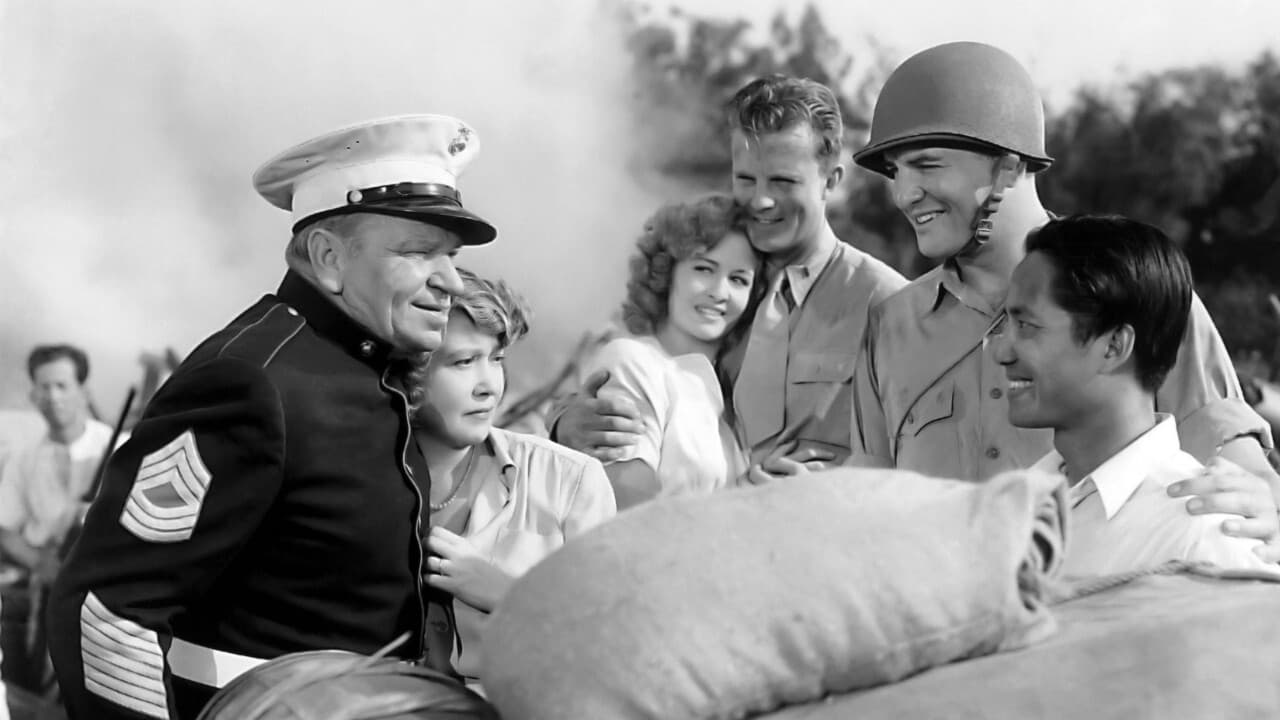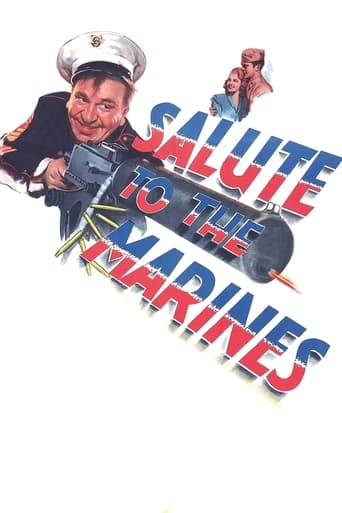



What makes it different from others?
Self-important, over-dramatic, uninspired.
If the ambition is to provide two hours of instantly forgettable, popcorn-munching escapism, it succeeds.
View MoreAmazing worth wacthing. So good. Biased but well made with many good points.
View MoreWell, I am a fan of the Marine Corps. True, I spent my four-year military career in the Coast Guard but it was just as rugged as the Marine Corps. It was very nice to be served breakfast in bed by the attractive, blond, seventeen-year-old Swedish maids but there must be no expression in Swedish for "medium rare" because they kept fouling up the steak and eggs. But I taught the Marines at Camp Lejeune for several years and they were among the best of students. When they're sharp, they're really sharp. It's also the only service in which the officers' dress uniforms were less gaudy than the enlisted man's.With that prologue out of the way I can now go on to say that Wallace Beery is no marine. My God, is he sloppy. His whole presence is one pile of flab upon another. He was fine as the comically sly Long John Silver but as a by-the-book top sergeant, he's plain incredible. It's almost painful, watching him rearrange the manifold dimples and gyri of his face into one or another expression.The movie, told mostly in flashback, begins in 1941 in the Philippines. Beery's job, as it must be in all such movies, is to bear down on his men and kick them into shape, the Filipino troops included, before he retires. That impending retirement is an event he dreads because he has never won any "battle decorations." He gets his chance. He retires at the proper time but just as he's finding out that inactivity doesn't suit him the Japanese invade the Philippine Islands pari passu. The "bandy legged Nips" and "monkeys" conquer town after town, forcing all the civilians to flee ahead of them. A determined Beery struggles into his dress blue blouse, mobilizes the American and Filipino troops, and stops the enemy long enough for the women and children to escape across the bridge.They're successful despite the bombs delivered by Japanese airplanes. The Japanese airplanes are dull-colored Vought Vindicators, an obsolete American dive bomber of the period, called disparagingly by pilots the "Vibrator" or "Wind Indicator." The Vindicator also plays itself, when American airplanes rush to the rescue of the beleaguered bridge defenders.Fans of old movies may enjoy it. There are a lot of familiar names in the cast but you won't notice them on the screen. The kids may get a kick out of it. But it's really made for Saturday afternoons when people went to the movies and didn't really care much about what was on the screen. William Manchester -- historian, journalist, and biographer of John F. Kennedy -- claimed that he was seduced into joining the Marines after seeing the snazzy uniforms in "The Shores of Tripoli." One look at Wallace Beery wrestling to get into his tent-sized blouse, and Manchester would have joined the Coast Guard.
View MoreMGM did this 1943 film in color which was rare doing wartime in those years for any studio to use. Probably 20th Century Fox filmed in color the most, still even their output was limited.Salute To The Marines stars Wallace Beery in one of his few color features and he brings his gruff, but lovable persona into the part of a training sergeant who is stationed in the Phillipines training new recruits for jungle combat which was thought by some to be inevitable. In fact a very farsighted commandant of the Marine Corps John Lejeune determined back in the early Twenties that the Marine Corps special mission was for amphibious landings. This is what the Beery character is working at when he gets an assignment to train Filipino civilians to fight.But a character like Beery would NEVER have been training anyone. The plot premise is that Beery, a thirty year veteran of the Corps would have missed every combat engagement in the Marines had which included Mexico, World War I, Haiti, Nicaragua etc. Now somewhere down the line he'd have been assigned some action or he wouldn't be training anyone, let alone rise to the rank of Sergeant Major.Still train he does and his civilian trainees prove adequate to the task even though they're not the most disciplined bunch.The climax is when the Japanese come Beery also proves adequate in fighting a delaying action after the Japanese bomb the church where he and wife Fay Bainter are attending services. This was on the same day where the Japanese were also doing a job on Pearl Harbor. MGM did a far better film a year earlier about the Phillipine campaign and the last stand on Bataan with Robert Taylor. That one holds up far better than Salute To The Marines.Shoehorned into the story is a kindly German store owner played by Reginald Owen who shows his true Nazi colors as the first Japanese troops land. Beery makes short work of him. The US Marines deserved a far better film than Salute To The Marines which is a dated relic of dubious propaganda value even then.
View MoreI enjoy watching war films and have seen countless films from the 30s onward to today. While this is not the best of the best, it is also far from the worst of the worst. An above-average war film.This film is a classic Hollywood War Film made during WWII in order to uplift the nation during its darkest days, sell War Bonds, and generate the much needed support for the United States Armed Forces in a time war! To rate this film based on today's standards is to do a disservice to the film and the period. Sure, this film has all of the clichés of a typical 40s Hollywood film. But, you have to understand that this was a way for many in Hollywood who chose not serve or could not serve for various reasons to assist in the war effort. In addition, it does a very good job as portraying the Marines as the best fighters of the US Military forces, no offense intended to the other branches. The Marines are known for hitting the beaches first and leaving last.Wallace Beery does an excellent job telling the story of the tough drill Sergeant who has passed on his skills and knowledge for thirty years waiting for his chance to see combat. He does his job well but wants what every Marine wants, to put his skills to the test.One rarity in Hollywood is the parts of the Filipinos and Japanese fighters are not being portrayed by White Men.In response to the Star-spangled hogwash review by Fred_Rap, I agree with Wholeben that Mr Rap's comments are out of context and unnecessarily harsh.The film was well made and made good use of scenery. While the "green screen" scenes are obvious, the actors deliver their performances well. The weakest part may be the overly friendly competition for the Helen Bailey's affections.The standout performance and reason to see this film is Wallace Beery's portrayal of a Marine who is a Marine regardless of whether he is in uniform. His speech after the Japanese bombing to Colonel Casper was very powerful. In addition the bar brawl against the Merchant Marines was great fun! Sergeant Major William Bailey will not allow anyone to disrespect his Marine Corps! My favorite scene in the film is the final moments with Beery in his Dress Blues sitting with his wife who has stayed behind to help instead of leaving with the other women and children. While she prayed for peace, when war came she stood by her husband and does what she can to help in his "War"!PS: The Japanese soldiers in this film were also portrayed fairly considering when the film was made. There is even a comment made about how smart their officers are in leading their troops. While the Japanese are portrayed as being "sneaky" in using the fishing fleet to prepare for invasion this is entirely understandable considering that the Attack on Pearl Harbor happened only two years prior to the film's release.
View Moregives a memorable performance. The jungle scene near the end of the movie is one of most moving scenes that I've ever witnessed. This film deserves preservation consideration. And why it's not available on DVD or VHS is a mystery.
View More